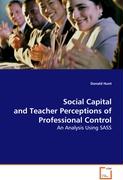- Start
- Social Capital and Teacher Perceptions ofProfessional Control
Social Capital and Teacher Perceptions ofProfessional Control
Angebote / Angebote:
American public schools are projected to need
approximately 350, 000 and 400, 000 new teachers every
year (Gerald and Hussar, 2004). Perhaps the most
effective means of meeting the demand for teachers is
by keeping them in the field of education. Up to 50
percent leave within the first five years of
teaching. This study looks at the contribution of
social capital to teachers' perceptions of curricular
and instructional control. Aspects of social capital
are shown to strongly influence teacher perceptions
of control in this study. Perceptions of control are
central to feelings of self-efficacy, job
satisfaction, longevity, and motivation. One avenue
to improving job satisfaction and performance, as
well as decreasing burn out, is to implement
strategies that contribute to that sense of control.
This study makes a connection between social capital
and control, which has policy and administrative
implications regarding how we can direct efforts to
keep teachers in the field. This study will be of
interest to those interested in social capital,
researchers using large scale datasets (such as
SASS), and policy makers.
Folgt in ca. 5 Arbeitstagen

